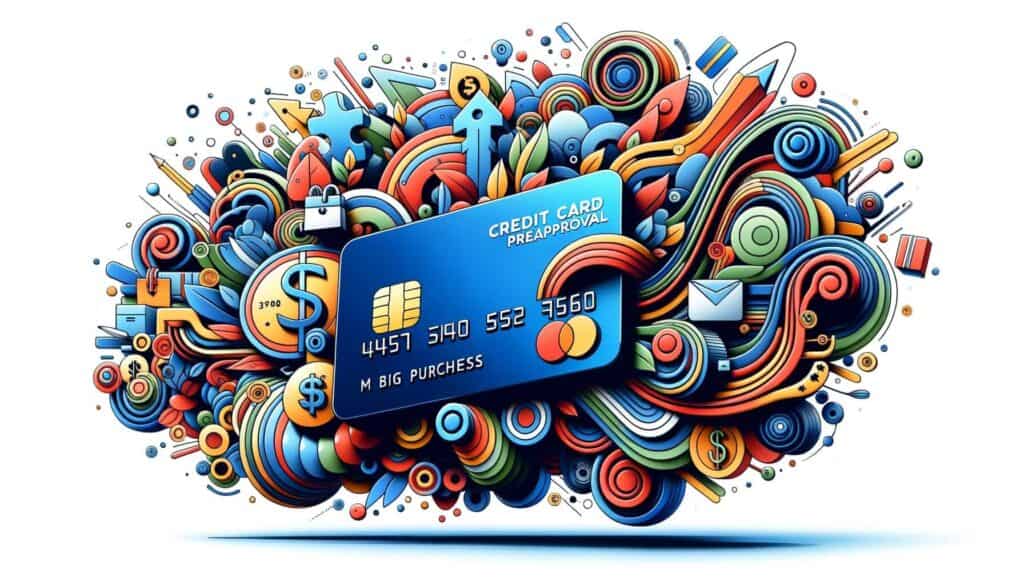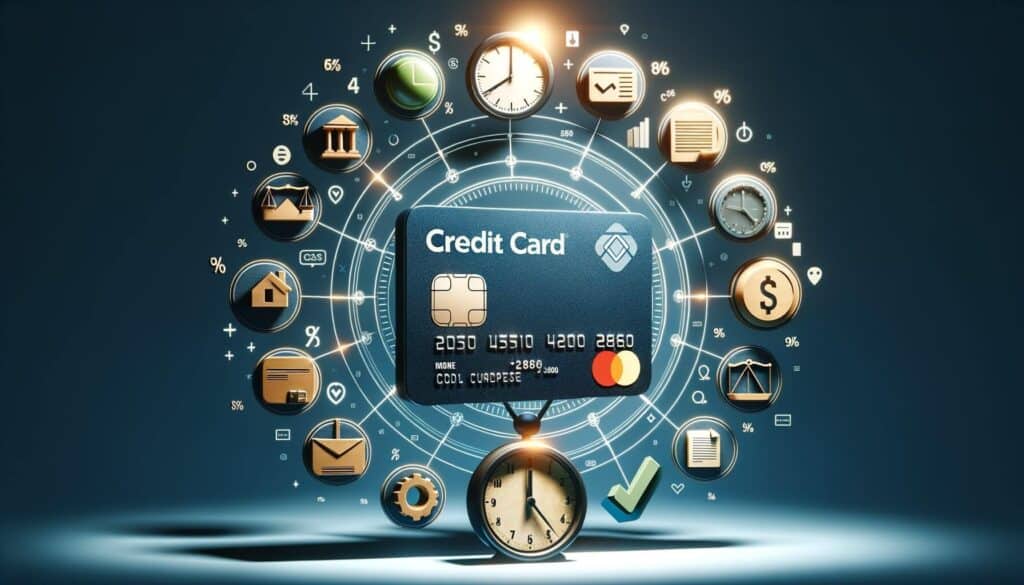
By admin March 11, 2025
Credit card preapproval is a process that allows individuals to determine their eligibility for a credit card before actually applying for one. It involves a preliminary evaluation of an individual’s creditworthiness by credit card issuers, based on certain criteria such as credit score, income, and existing debt. This preapproval process helps individuals make informed decisions about which credit cards to apply for, saving them time and effort by avoiding unnecessary rejections.
How Does Credit Card Preapproval Work?
Credit card preapproval works by credit card issuers assessing an individual’s creditworthiness using a soft credit inquiry. This inquiry does not impact the individual’s credit score and is different from a hard credit inquiry, which occurs when an individual actually applies for a credit card. The soft credit inquiry allows credit card issuers to review an individual’s credit history and determine if they meet the criteria for preapproval.
To initiate the credit card preapproval process, individuals can either receive preapproval offers from credit card issuers or proactively seek preapproval by submitting their information to credit card issuers. Preapproval offers are often sent through mail or email and contain a unique invitation code that individuals can use to apply for the credit card. Alternatively, individuals can visit credit card issuer websites and fill out preapproval forms, providing their personal and financial information for evaluation.
Benefits of Credit Card Preapproval

Credit card preapproval offers several benefits to individuals. Firstly, it allows individuals to assess their creditworthiness without impacting their credit score. Since preapproval involves a soft credit inquiry, it does not leave a negative mark on an individual’s credit report. This is particularly advantageous for individuals who are concerned about their credit score and want to avoid unnecessary credit inquiries.
Secondly, credit card preapproval helps individuals save time and effort by narrowing down their options. Instead of applying for multiple credit cards and potentially facing rejections, individuals can focus on credit cards for which they have a higher chance of approval. This streamlines the application process and increases the likelihood of obtaining a credit card that suits their needs.
Furthermore, credit card preapproval can provide individuals with a sense of financial security. By knowing that they are preapproved for a credit card, individuals can have confidence in their ability to access credit when needed. This can be particularly beneficial in emergency situations or when individuals are planning major purchases.
Factors Considered in Credit Card Preapproval

Credit card issuers consider several factors when evaluating individuals for preapproval. These factors help determine an individual’s creditworthiness and the likelihood of them being approved for a credit card. Some of the key factors considered in credit card preapproval include:
1. Credit Score: Credit card issuers typically look at an individual’s credit score to assess their creditworthiness. A higher credit score indicates a lower risk of defaulting on payments and increases the chances of preapproval.
2. Income: Credit card issuers also consider an individual’s income to determine their ability to repay credit card debt. A higher income generally indicates a higher likelihood of preapproval.
3. Existing Debt: The amount of existing debt an individual has can impact their creditworthiness. Credit card issuers may be hesitant to preapprove individuals with high levels of existing debt, as it may indicate a higher risk of default.
4. Payment History: Credit card issuers review an individual’s payment history to assess their reliability in making timely payments. A positive payment history increases the chances of preapproval.
5. Credit Utilization: The percentage of available credit an individual is currently using, known as credit utilization, is also considered in credit card preapproval. A lower credit utilization ratio indicates responsible credit management and can improve the chances of preapproval.
How to Get Preapproved for a Credit Card

To get preapproved for a credit card, individuals can follow a few simple steps:
1. Check Credit Reports: Before seeking preapproval, individuals should review their credit reports to ensure accuracy and identify any potential issues that may affect their creditworthiness. They can obtain free credit reports from the three major credit bureaus – Equifax, Experian, and TransUnion – once a year.
2. Improve Credit Score: If individuals have a low credit score, they can take steps to improve it before seeking preapproval. This may include paying bills on time, reducing credit card balances, and disputing any errors on their credit reports.
3. Research Credit Card Options: Individuals should research different credit card options to determine which ones align with their financial goals and needs. They can compare interest rates, rewards programs, annual fees, and other features to find the most suitable credit cards.
4. Receive Preapproval Offers: Individuals may receive preapproval offers from credit card issuers through mail or email. These offers typically contain a unique invitation code that individuals can use to apply for the credit card.
5. Seek Preapproval Online: Alternatively, individuals can visit credit card issuer websites and fill out preapproval forms. These forms typically require personal and financial information, such as name, address, income, and social security number.
6. Evaluate Preapproval Offers: Once individuals receive preapproval offers or complete preapproval forms, they should carefully evaluate the terms and conditions of the offers. This includes reviewing interest rates, fees, and any promotional offers.
7. Apply for the Credit Card: After evaluating preapproval offers, individuals can proceed with applying for the credit card. They will need to provide additional information, such as employment details and identification documents, to complete the application process.
Understanding Credit Card Preapproval Offers

Credit card preapproval offers can vary in terms of the information provided and the level of commitment from the credit card issuer. It is important for individuals to understand the different types of preapproval offers to make informed decisions. Some common types of preapproval offers include:
1. Prequalified Offers: Prequalified offers are the most basic type of preapproval offers. They indicate that an individual meets certain criteria set by the credit card issuer, but it does not guarantee approval. Prequalified offers are often sent to individuals based on their credit profiles and can be a starting point for further evaluation.
2. Preapproved Offers: Preapproved offers are more specific and indicate that an individual has met the credit card issuer’s criteria for approval. These offers typically come with a higher likelihood of approval, but it is still not a guarantee. Individuals may need to provide additional information or documentation to complete the application process.
3. Guaranteed Approval Offers: Guaranteed approval offers are rare and typically targeted towards individuals with poor credit or no credit history. These offers guarantee approval regardless of an individual’s creditworthiness. However, they often come with high fees, low credit limits, and unfavorable terms and conditions.
It is important for individuals to carefully review the terms and conditions of preapproval offers, including interest rates, fees, and any promotional offers. They should also consider their own financial situation and needs before accepting any preapproval offers.
Tips for Maximizing Credit Card Preapproval Opportunities
To maximize credit card preapproval opportunities, individuals can follow these tips:
1. Maintain a Good Credit Score: A good credit score increases the chances of preapproval. Individuals should strive to maintain a credit score above 700 by making timely payments, keeping credit card balances low, and avoiding unnecessary credit inquiries.
2. Pay Bills on Time: Consistently paying bills on time helps build a positive payment history, which is an important factor in credit card preapproval. Individuals should set up automatic payments or reminders to ensure timely payments.
3. Reduce Existing Debt: Lowering existing debt levels can improve an individual’s creditworthiness and increase the likelihood of preapproval. Individuals should focus on paying off high-interest debts and avoiding new debt before seeking preapproval.
4. Limit Credit Applications: Excessive credit applications can negatively impact an individual’s credit score and reduce the chances of preapproval. Individuals should only apply for credit cards that align with their needs and avoid unnecessary applications.
5. Opt-Out of Preapproval Offers: If individuals do not want to receive preapproval offers, they can opt-out by contacting the credit reporting agencies. This can help reduce unwanted solicitations and protect personal information.
6. Research Credit Card Issuers: Before seeking preapproval, individuals should research different credit card issuers to find reputable ones with favorable terms and conditions. They can read reviews, compare interest rates and fees, and consider customer service ratings.
7. Read the Fine Print: It is crucial for individuals to carefully read the terms and conditions of preapproval offers. This includes understanding interest rates, fees, grace periods, and any promotional offers. Individuals should also be aware of any potential changes to the terms and conditions after the introductory period.
Common Misconceptions about Credit Card Preapproval
There are several common misconceptions about credit card preapproval that individuals should be aware of:
1. Preapproval Guarantees Approval: Preapproval does not guarantee approval for a credit card. It is an initial evaluation of an individual’s creditworthiness, but the final decision is made during the actual application process. Credit card issuers may request additional information or documentation before approving an application.
2. Preapproval Impacts Credit Score: Credit card preapproval involves a soft credit inquiry, which does not impact an individual’s credit score. However, if an individual proceeds with the actual credit card application, it will result in a hard credit inquiry, which can temporarily lower the credit score.
3. Preapproval Offers are Customized: Preapproval offers are often sent to a large number of individuals who meet certain criteria set by the credit card issuer. They are not customized to an individual’s specific financial situation or needs. Individuals should carefully review the terms and conditions of preapproval offers to ensure they align with their requirements.
4. Preapproval Offers are the Best Deals: While preapproval offers can be a starting point for evaluating credit card options, they may not always be the best deals available. Individuals should research different credit cards and compare interest rates, fees, rewards programs, and other features to find the most suitable option.
5. Preapproval is a Binding Agreement: Preapproval offers are not binding agreements. Individuals are under no obligation to accept the preapproval offers or proceed with the credit card application. They can decline the offers or explore other options without any consequences.
Frequently Asked Questions about Credit Card Preapproval
Q1. Does credit card preapproval guarantee approval for a credit card?
Answer: No, credit card preapproval does not guarantee approval for a credit card. It is an initial evaluation of an individual’s creditworthiness, but the final decision is made during the actual application process.
Q2. Does credit card preapproval impact my credit score?
Answer: No, credit card preapproval involves a soft credit inquiry, which does not impact an individual’s credit score. However, if an individual proceeds with the actual credit card application, it will result in a hard credit inquiry, which can temporarily lower the credit score.
Q3. Can I opt-out of receiving preapproval offers?
Answer: Yes, individuals can opt-out of receiving preapproval offers by contacting the credit reporting agencies. This can help reduce unwanted solicitations and protect personal information.
Q4. Are preapproval offers customized to my financial situation?
Answer: Preapproval offers are often sent to a large number of individuals who meet certain criteria set by the credit card issuer. They are not customized to an individual’s specific financial situation or needs. Individuals should carefully review the terms and conditions of preapproval offers to ensure they align with their requirements.
Q5. Are preapproval offers the best deals available?
Answer: While preapproval offers can be a starting point for evaluating credit card options, they may not always be the best deals available. Individuals should research different credit cards and compare interest rates, fees, rewards programs, and other features to find the most suitable option.
Conclusion
Credit card preapproval is a valuable tool for individuals looking to obtain a credit card. It allows individuals to assess their creditworthiness without impacting their credit score and saves them time and effort by narrowing down their options. By understanding the factors considered in credit card preapproval and following the steps to get preapproved, individuals can increase their chances of obtaining a credit card that suits their needs.
It is important to carefully evaluate preapproval offers, consider personal financial situations, and be aware of common misconceptions about credit card preapproval. By maximizing credit card preapproval opportunities, individuals can make informed decisions and access credit when needed.